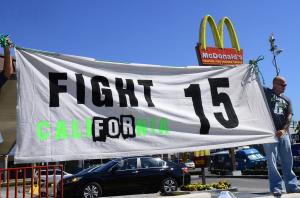Some economists are warning that the Los Angeles City Council’s approval of what is essentially a $1.20 per year increase in the minimum wage for the next five years will be so inflationary that rents and other prices will rise.
That analysis assumes that inflating wages by 10.76 percent a year will not motivate more employer automation and fewer jobs. With about half of minimum wage workers aged 16-24, the losers from LA’s minimum wage hike will likely end up back in their parents’ homes.
National Public Radio (NPR) interviewed UCLA housing researcher Rosalie Ray,who worries that when the 700,000 minimum wage workers in Los Angeles that earn $19,000 today are earning a little more than $30,000 a year in 2020, rental costs will skyrocket. Ray warned, “What you’re essentially doing is increasing the buying power without increasing the supply, which will just drive up the prices,” Ray said.
Typical of UCLA academics and NPR, their answer to this impending “problem” of prosperity is to build more government subsidized low-cost and public housing.
According to the latest Los Angeles County Business Federation poll, “high taxes, restrictive regulations, excessive permitting and minimum wage hikes” are job killers. Although 40 percent of Federation employers are considering adding employees, 59 percent intend to make the type of capital investments that automate away jobs.
Despite liberal politicians’ claim their policies help the poor, Los Angeles holds the crown as America’s Poorest Big City, according to analysis by the American Community Survey-based Census Bureau data. Of the 25 major metropolitan areas in 2013, Los Angeles-Long Beach-Anaheim took the booby prize for having the highest poverty rate at 17.6%. California’s overall rate of poverty was also the top contender at 16.8%.
The UCLA study and NPR do not realize that about 62 percent of all minimum wage workers are currently enrolled in school. They tend to live in middle-class households and are typically not their family’s sole breadwinner.
Since the drive began in the late 1990s for mandated federal, state and local minimum wage hikes, the labor workforce participation rate for 16-24 year old workers have plummeted by 17.4 percent. Much of this shrinkage in youth employment is directly correlated to higher minimum wages encouraging businesses to replace people with mahcines.
As Tracy Rafter, Chief Executive of the Los Angeles County Business Federation commented on this year’s poll results, “Hiring, which it’s a bit better, is not where things are growing–they’re growing in technology,” because “People cost so much more than technology over time.”
The UCLA academic and NPR have little to worry about LLA’s higher minimum wage law causing rental housing inflation. A big percentage of today’s minimum wage workers will soon be replaced by machines. For the few fortunate youth that were earning minimum wage and had their own apartments, many will soon be back living in their parents’ home.

COMMENTS
Please let us know if you're having issues with commenting.